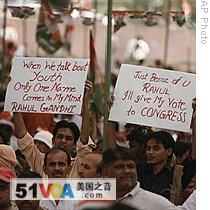New Delhi
30 April 2009
India has held another round of its staggered general election, which is being conducted in five stages over a month. The third phase of polling will play a key role in deciding the fortunes of the opposition Hindu nationalist Bharatiya Janata Party, which wants to wrest power from the ruling Congress-led coalition.
From the financial hub, Mumbai in the west, to insurgency wracked Kashmir in the north, millions of people cast votes on Thursday for 107 out of 543 parliamentary seats. Following this round, voting has been completed in about two-thirds of the vast country.
Stakes are high for the opposition Bharatiya Janata Party, as several of its strongholds such as Gujarat, Madhya Pradesh and Karnataka states went to the polls.
In particular, the BJP is hoping to put up a good show in Gujarat, which the party is showcasing as a region which has made huge strides in economic development under the rule of its most prominent and controversial leader, Narendra Modi.
 |
| Congress Party supporters hold posters at a rally addressed by party leader Rahul Gandhi in Ghaziabad, India, 30 Apr 2009 |
Advani says his assessment during campaigning is that the BJP will emerge the largest single party in the election. He says people are supporting the alliance led by the Hindu nationalists.
Another prominent candidate is the head of the ruling Congress Party, Sonia Gandhi. She is contesting from Rae Bareilly in Uttar Pradesh.
Not all the focus is on the two national parties. In several states that voted, such as West Bengal and Bihar, regional and left parties are on the frontlines and will be key in deciding who will head the next government.
In Mumbai, security was a prime concern for many middle class people voting five months after terror strikes killed 166 people in the city. But for most poor people across the country, development or local issues outweighed concerns about security.
In the Anantnag region of Kashmir, where a Muslim separatist insurgency has raged for two decades, polling was held amid tight security. A call for a poll boycott and a general strike by separatist groups appeared to have deterred some voters, but a trickle of people turned up at polling booths. The voter turnout in Kashmir is regarded as a barometer of support for separatist groups.
Barring a few incidents of violence, polling was peaceful in most of the country.
The results of the month-long election will be known on May 16 when votes are counted after two more rounds of polling. India's general election - the world's largest democratic exercise - is held in phases to allow millions of security forces to move around the country.